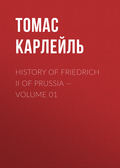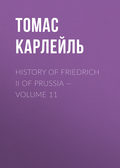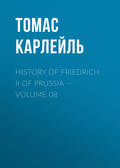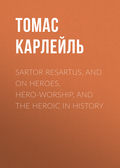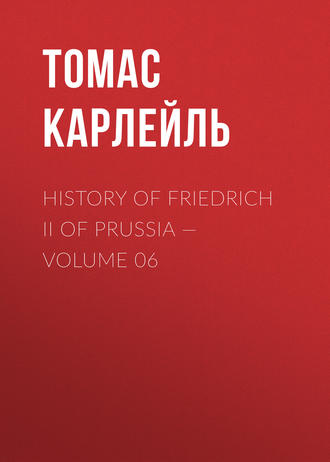
Томас Карлейль
History of Friedrich II of Prussia — Volume 06
Chapter IV. — DOUBLE-MARRIAGE PROJECT IS NOT DEAD
And the Double-Marriage, in such circumstances, are we to consider it as dead, then? In the soul of Queen Sophie and those she can influence, it lives flame-bright; but with all others it has fallen into a very dim state. Friedrich Wilhelm is still privately willing, perhaps in a degree wishful; but the delays, the supercilious neglects have much disgusted him; and he, in the mean while, entertains those new speculations. George II., never a lover of the Prussian Majesty's nor loved by him, has been very high and distant ever since his Accession; offensive rather than otherwise. He also is understood to be vaguely willing for the thing; willing enough, would it be so kind as accomplish itself without trouble to him. But the settlements, the applications to Parliament:—and all for this perverse Fred, who has become unlovely, and irritates our royal mind? George pushes the matter into its pigeon-holes again, when brought before him. Higher thoughts occupy the soul of little George. Congress of Soissons, Convention of the Pardo, [Or, in effect, "Treaty of Madrid," 6th March, 1728. This was the PREFACE to Soissons; Termagant at length consenting there, "at her Palace of the Pardo" (Kaiser and all the world urging her for ten months past), to accept the Peace, and leave off besieging Gibraltar to no purpose (Coxe, i. 303).] Treaty of Seville; a part to be acted on the world-theatre, with applauses, with envies, almost from the very demi-gods? Great Kaisers, overshadowing Nature with their Pragmatic Sanctions, their preternatural Diplomacies, and making the Terrestrial Balance reel hither and thither;—Kaisers to be clenched perhaps by one's dexterity of grasp, and the Balance steadied again? Prussian Double-Marriage!
One royal soul there is who never will consent to have the Double-Marriage die: Queen Sophie. She had passed her own private act-of-parliament for it; she was a very obstinate wife, to a husband equally obstinate. "JE BOULEVERSERAI L'EMPIRE," writes she once; "I will overturn the German Empire," if they drive me to it, in this matter. [Letter copied by Dubourgay (in Despatch, marked PRIVATE, to Lord Townshend, 3d-14th May, 1729); no clear address given,—probably to Dubourgay himself, CONVEYED by "a Lady" (one of the Queen's Ladies), as he dimly intimates.] What secret manoeuvring and endeavoring went on unweariedly on royal Sophie's part, we need not say; nor in what bad element, of darkness and mendacity, of eavesdropping, rumoring, backstairs intriguing, the affair now moved. She corresponds on it with Queen Caroline of England; she keeps her two children true to it, especially her Son, the more important of them.
CROWN-PRINCE FRIEDRICH WRITES CERTAIN LETTERS
Queen Sophie did not overturn the Empire, but she did almost overturn her own and her family's existence, by these courses; which were not wise in her case. It is certain she persuaded Crown-Prince Friedrich, who was always his Mother's boy, and who perhaps needed little bidding in this instance, "to write to Queen Caroline of England;" Letters one or several: thrice-dangerous Letters; setting forth (in substance), His deathless affection to that Beauty of the world, her Majesty's divine Daughter the Princess Amelia (a very paragon of young women, to judge by her picture and one's own imagination); and likewise the firm resolution he, Friedrich Crown-Prince, has formed, and the vow he hereby makes, Either to wed that celestial creature when permitted, or else never any of the Daughters of Eve in this world. Congresses of Soissons, Smoking Parliaments, Preliminaries of the Pardo and Treaties of Seville may go how they can. If well, it shall be well: if not well, here is my vow, solemn promise and unchangeable determination, which your gracious Majesty is humbly entreated to lay up in the tablets of your royal heart, and to remember on my behalf, should bad days arise!—
It is clear such Letters were sent; at what date first beginning, we do not know;—possibly before this date? Nor would matters rise to the vowing pitch all at once. One Letter, supremely dangerous should it come to be known, Wilhelmina has copied for us, [Wilhelmina, i. 183.]—in Official style (for it is the Mother's composition this one) and without date to it:—the guessable date is about two years hence; and we will give the poor Document farther on, if there be place for it.
Such particulars are yet deeply unknown to Friedrich Wilhelm; but he surmises the general drift of things in that quarter; and how a disobedient Son, crossing his Father's will in every point, abets his Mother's disobedience, itself audacious enough, in regard to this one. It is a fearful aggravation of Friedrich Wilhelm's ill-humor with such a Son, which has long been upon the growing hand. His dislikes, we know, were otherwise neither few nor small. Mere "disLIKES" properly so called, or dissimilarities to Friedrich Wilhelm, a good many of them; dissimilarities also to a Higher Pattern, some! But these troubles of the Double-Marriage will now hurry them, the just and the unjust of them, towards the flaming pitch. The poor youth has a bad time; and the poor Father too, whose humor we know! Surly gusts of indignation, not unfrequently cuffs and strokes; or still worse, a settled aversion, and rage of the chronic kind; studied neglect and contempt,—so as not even to help him at table, but leave him fasting while the others eat; [Dubourgay, SCAPIUS.] this the young man has to bear. The innumerable maltreatments, authentically chronicled in Wilhelmina's and the other Books, though in a dateless, unintelligible manner, would make a tragic sum!—Here are two Billets, copied from the Prussian State-Archives, which will show us to what height matters had gone, in this the young man's seventeenth year.
TO HIS MAJESTY (from the Crown-Prince).
"WUSTERHAUSEN, 11th September, 1728.
MY DEAR PAPA,—I have not, for a long while, presumed to come to my dear Papa; partly because he forbade me; but chiefly because I had reason to expect a still worse reception than usual: and, for fear of angering my dear Papa by my present request, I have preferred making it in writing to him.
I therefore beg my dear Papa to be gracious to me; and can here say that, after long reflection, my conscience has not accused me of any the least thing with which I could reproach myself. But if I have, against my will and knowledge, done anything that has angered my dear Papa, I herewith most submissively beg forgiveness; and hope my dear Papa will lay aside that cruel hatred which I cannot but notice in all his treatment of me. I could not otherwise suit myself to it; as I always thought I had a gracious Papa, and now have to see the contrary. I take confidence, then, and hope that my dear Papa will consider all this, and again be gracious to me. And, in the mean while, I assure him that I will never, all my days, fail with my will; and, notwithstanding his disfavor to me, remain
"My dear Papa's
"Most faithful and obedient Servant and Son,
"FRIEDRICH."
To which Friedrich Wilhelm, by return of messenger, writes what follows. Very implacable, we may perceive;—not calling his Petitioner "Thou," as kind Paternity might have dictated; infinitely less by the polite title "They (SIE)," which latter indeed, the distinguished title of "SIC," his Prussian Majesty, we can remark, reserves for Foreigners of the supremest quality, and domestic Princes of the Blood; naming all other Prussian subjects, and poor Fritz in this place, "He (ER)," in the style of a gentleman to his valet,—which style even a valet of these new days of ours would be unwilling to put up with. "ER, He," "His" and the other derivatives sound loftily repulsive in the German ear; and lay open impassable gulfs between the Speaker and the Spoken-to. "His obstinate"—But we must, after all, say THY and THOU for intelligibility's sake:—
"Thy obstinate perverse disposition [KOPF, head], which does not love thy Father,—for when one does everything [everything commanded] and really loves one's Father, one does what the Father requires, not while he is there to see it, but when his back is turned too [His Majesty's style is very abstruse, ill-spelt, intricate, and in this instance trips itself, and falls on its face here, a mere intricate nominative without a verb!]—For the rest, thou know'st very well that I can endure no effeminate fellow (EFEMINIRTEN KERL), who has no human inclination in him; who puts himself to shame, cannot ride nor shoot; and withal is dirty in his person; frizzles his hair like a fool, and does not cut it off. And all this I have, a thousand times, reprimanded; but all in vain, and no improvement in nothing (KEINE BESSERUNG IN NITS IST). For the rest, haughty, proud as a churl; speaks to nobody but some few, and is not popular and affable; and cuts grimaces with his face, as if he were a fool; and does my will in nothing unless held to it by force; nothing out of love;—and has pleasure in nothing but following his own whims [own KOPF],—no use to him in anything else. This is the answer.
"FRIEDRICH WILHELM."
[Preuss, i. 27; from Cramer, pp. 33, 34.]
DOUBLE-MARRIAGE PROJECT RE-EMERGES IN AN OFFICIAL SHAPE
These are not favorable outlooks for the Double-Marriage. Nevertheless it comes and goes; and within three weeks later, we are touched almost with a kind of pity to see it definitely emerging in a kind of Official state once more. For the question is symbolical of important political questions. The question means withal, What is to be done in these dreadful Congress-of-Soissons complexities, and mad reelings of the Terrestrial Balance? Shall we hold by a dubious and rather losing Kaiser of this kind, in spite of his dubieties, his highly inexplicit, procedures (for which he may have reasons) about the Promise of Julich and Berg? Or shall we not clutch at England, after all,—and perhaps bring him to terms? The Smoking Parliament had no Hansard; but, we guess its Debates (mostly done in dumb-show) were cloudy, abstruse and abundant, at this time! The Prussian Ministers, if they had any power, take different sides; old Ilgen, the oldest and ablest of them, is strong for England.
Enough, in the beginning of October, Queen Sophie, "by express desire of his Majesty," who will have explicit, Yes or No on that matter, writes to England, a Letter "PRIVATE AND OFFICIAL," of such purport,—Letter (now invisible) which Dubourgay is proud to transmit. [Despatch, 5th October, 1728, in State-Paper Office.] Dubourgay is proud; and old Ilgen, her Majesty informed me on the morrow, "wept for joy," so zealous was he on that side. Poor old gentleman,—respectable rusty old Iron Safe with seven locks, which nobody would now care to pick,—he died few weeks after, at his post as was proper; and saw no Double-Marriage, after all. But Dubourgay shakes out his feathers; the Double-Marriage being again evidently alive.
For England answers, cordially enough, if not, with all the hurry Friedrich Wilhelm wanted, "Yea, we are willing for the thing;"—and meets, with great equanimity and liberality, the new whims, difficulties and misgivings, which arose on Friedrich Wilhelm's part, at a wearisome rate, as the negotiation went on; and which are always frankly smoothed away again by the cooler party. Why did not the bargain close, then? Alas, one finds, the answer YEA had unfortunately set his Prussian Majesty on viewing, through magnifiers, what advantages there might have been in NO: this is a difficulty there is no clearing away! Probably, too, the Tobacco-Parliament was industrious. Friedrich Wilhelm, at last, tries if Half will not do; anxious, as we all too much are, "to say Yes AND No;" being in great straits, poor man:—"Your Prince of Wales to wed Wilhelmina at once; the other Match to stand over?" To which the English Government answers always briefly, "No; both the Marriages or none!"—Will the reader consent to a few compressed glances into the extinct Dubourgay Correspondence; much compressed, and here and there a rushlight stuck in it, for his behoof. Dubourgay, at Berlin, writes; my Lord Townshend, in St. James's reads, usually rather languid in answering:—
BERLIN, 9th NOVEMBER, 1728. "Prussian Majesty much pleased with English Answers" to the Yes-or-No question: "will send a Minister to our Court about the time his Britannic Majesty may think of coming over to his German Dominions. Would Finkenstein (Head Tutor), or would Knyphausen (distinguished Official here), be the agreeable man?" "Either," answer the English; "either is good."
BERLIN, SAME DATE. "Queen sent for me just now; is highly content with the state of things. 'I have now,' said her Majesty, 'the pleasure to tell you that I am free, God be blessed, of all the anguish I have labored under for some time past, which was so great that I have several times been on the point of sending for you to procure my Brother's protection for my Son, who, I thought, ran the greatest danger from the artifices of Seckendorf and'"—Poor Queen!
NOV, 16th. "Queen told me: When the Court was at Wusterhausen," two months ago, hunting partridges and wild swine, [Fassmann, p. 386.] "Seckendorf and Grumkow intrigued for a match between Wilhelmina and the Prince of Weissenfels," elderly Royal Highness in the Abstract, whom we saw already, "thereby to prevent a closer union between the Prussian and English Courts,—and Grumkow having withal the private view of ousting his antagonist the Prince of Anhalt [Old Dessauer, whom he had to meet in duel, but did not fight], as Weissenfels, once Son-in-law, would certainly be made Commander-in-Chief," [Dubourgay, in State-Paper Office (Prussian Despatches, vol. XXXV.)] to the extrusion of Anhalt from that office. Which notable piece of policy her Majesty, by a little plain speech, took her opportunity of putting an end to, as we saw. For the rest, "the Dutch Minister and also the French Secretaries here," greatly interested about the peace of Europe, and the Congress of Soissons in these weeks, "have had a communication from this Court, of the favorable disposition ours is in with respect to the Double Match,"—beneficent for the Terrestrial Balance, as they and I hope. So that things look well? Alas,—
DECEMBER 25th. "Queen sent for me yesterday: Hopes she does no wrong in complaining of her Husband to her Brother. King shows scruples about the Marriages; does not relish the expense of an establishment for the Prince; hopes, at all events, the Marriage will not take place for a year yet;—would like to know what Dowry the English Princess is to bring?"—"No Dowry with our Princess," the English answer; "nor shall you give any with yours."
NEW-YEAR'S DAY, 1729. "Queen sent for me: King is getting intractable about the Marriages; she reasoned with him from two o'clock till eight," without the least permanent effect. "It is his covetousness," I Dubourgay privately think!—Knyphausen, who knows the King well, privately tells me, "He will come round." "It is his avarice," thinks Knyphausen too; "nay it is also his jealousy of the Prince, who is very popular with the Army. King does everything to mortify him, uses him like a child; Crown-Prince bears it with admirable patience." This is Knyphausen's weak notion; rather a weak creaky official gentleman, I should gather, of a cryptosplenetic turn. "Queen told me some days later, His Majesty ill-used the Crown-Prince, because he did not drink hard enough; makes him hunt though ill;" is very hard upon the poor Crown-Prince,—who, for the rest, "sends loving messages to England," as usual; [Dubourgay, 16th January.] covertly meaning the Princess Amelia, as usual. "Some while ago, I must inform your Lordship, the Prince was spoken to," by Papa as would appear, "to sound his inclination as to the Princess Caroline," Princess likewise of England, and whose age, some eighteen months less than his own, might be suitabler, the Princess Amelia being half a year his elder; [Caroline born 10th June 1713; Amelia, 10th July, 1711.] "but,"—mark how true he stood,—"his Royal Highness broke out into such raptures of love and passion for the Princess Amelia, and showed so much impatience for the conclusion of that Match, as gave the King of Prussia a great deal of surprise, and the Queen as much satisfaction." Truth is, if an old Brigadier Diplomatist may be judge, "The great and good qualities of that young Prince, both of person and mind, deserve a distinct and particular account, with which I shall trouble your Lordship another day;" [Despatch, 25th December, 1728.]—which unluckily I never did; his Lordship Townshend having, it would seem, too little curiosity on the subject.
And so the matter wavers; and in spite of Dubourgay's and Queen Sophie's industry, and the Crown-Prince's willing mind, there can nothing definite be made of it at this time. Friedrich Wilhelm goes on visits, goes on huntings; leaves the matter to itself to mature a little. Thus the negotiation hangs fire; and will do so,—till dreadful waterspouts come, and perhaps quench it altogether?
HIS MAJESTY SLAUGHTERS 3,602 HEAD OF WILD SWINE
His Majesty is off for a Hunting Visit to the Old Dessauer,—Crown-Prince with him, who hates hunting. Then, "19th January, 1729," says the reverential Fassmann, he is off for a grand hunt at Copenick; then for a grander in Pommern (Crown-Prince still with him): such a slaughter of wild swine as was seldom heard of, and as never occurred again. No fewer than "1,882 head (STUCK) of wild swine, 300 of them of uncommon magnitude," in the Stettin and other Pommern regions; "together with 1,720 STUCK in the Mark Brandenburg, once 450 in a day: in all, 3,602 STUCK." Never was his Majesty in better spirits: a very Nimrod or hunting Centaur; trampling the cobwebs of Diplomacy, and the cares of life, under his victorious hoofs. All this slaughter of swine, 3,602 STUCK by tale, was done in the season 1729. "From which," observes the adoring Fassmann, [p. 387.] "is to be inferred the importance," at least in wild swine, "of those royal Forests in Pommern and the Mark;" not to speak of his Majesty's supreme talent in hunting, as in other things.
What Friedrich Wilhelm did with such a mass of wild pork? Not an ounce of it was wasted, every ounce of it brought money in. For there exist Official Schedules, lists as for a window-tax or property-tax, drawn up by his Majesty's contrivance, in the chief Localities: every man, according to the house he keeps, is bound to take, at a just value by weight, such and such quotities of suddenly slaughtered wild swine, one or so many,—and consume them at his leisure, as ham or otherwise,—cash payable at a fixed term, and no abatement made. [Forster, Beneckendorf (if they had an Index I).] For this is a King that cannot stand waste at all; thrifty himself, and the Cause of thrift.
FALLS ILL, IN CONSEQUENCE; AND THE DOUBLE-MARRIAGE CANNOT GET FORWARD
This was one of Friedrich Wilhelm's grandest hunting-bouts, this of January, 1729; at all events, he will never have another such. By such fierce riding, and defiance of the winter elements and rules of regimen, his Majesty returned to Potsdam with ill symptoms of health;—symptoms never seen before; except transiently, three years ago, after a similar bout; when the Doctors, shaking their heads, had mentioned the word "Gout."—"NARREN-POSSEN!" Friedrich Wilhelm had answered, "Gout?"—But now, February, 1729, it is gout in very deed. His poor Majesty has to admit: "I am gouty, then! Shall have gout for companion henceforth. I am breaking up, then?" Which is a terrible message to a man. His Majesty's age is not forty-one till August coming; but he has hunted furiously.
Adoring Fassmann gives a quite touching account of Friedrich Wilhelm's performances under gout, now and generally, which were begun on this occasion. How he suffered extremely, yet never neglected his royal duties in any press of pain. Could seldom get any sleep till towards four or five in the morning, and then had to be content with an hour or two; after which his Official Secretaries came in with their Papers, and he signed, despatched, resolved, with best judgment,—the top of the morning always devoted to business. At noon, up if possible; and dines, "in dressing-gown, with Queen and children." After dinner, commonly to bed again; and would paint in oil; sometimes do light joiner-work, chiselling and inlaying; by and by lie inactive with select friends sitting round, some of whom had the right of entry, others not, under penalties. Buddenbrock, Derschau, rough old Marlborough stagers, were generally there; these, "and two other persons,"—Grumkow and Seckendorf, whom Fassmann does not name, lest he get into trouble,—"sat, well within earshot, round the bed. And always at the head was TheirO Majesty the Queen, sometimes with the King's hand laid in hers, and his face turned up to her, as if he sought assuagement"—O my dim old Friend, let us dry our tears!
"Sometimes the Crown-Prince read aloud in some French Book," Title not given; Crown-Prince's voice known to me as very fine. Generally the Princess Louisa was in the room, too; Louisa, who became of Anspach shortly; not Wilhelmina, who lies in fever and relapse and small-pox, and close at death's door, almost since the beginning of these bad days. The Crown-Prince reads, we say, with a voice of melodious clearness, in French more or less instructive. "At other times there went on discourse, about public matters, foreign news, things in general; discourse of a cheerful or of a serious nature," always with some substance of sense in it,—"and not the least smut permitted, as is too much the case in certain higher circles!" says adoring Fassmann; who privately knows of "Courts" (perhaps the GLORWURDIGSTE, Glory-worthiest, August the Great's Court, for one?) "with their hired Tom-Fools," not yet an extinct species attempting to ground wit on that bad basis. Prussian Majesty could not endure any "ZOTEN:" profanity and indecency, both avaunt. "He had to hold out in this way, awake till ten o'clock, for the chance of night's sleep." Earlier in the afternoon, we said, he perhaps does a little in oil-painting, having learnt something of that art in young times;—there is a poor artist in attendance, to mix the colors, and do the first sketch of the thing. Specimens of such Pictures still exist, Portraits generally; all with this epigraph, FREDERICUS WILHELMUS IN TORMENTIS PINXIT (Painted by Friedrich Wilhelm in his torments); and are worthy the attention of the curious. [Fassmann, p. 392; see Forster, &c.] Is not this a sublime patient?
Fassmann admits, "there might be spurts of IMpatience now and then; but how richly did Majesty make it good again after reflection! He was also subject to whims even about people whom he otherwise esteemed. One meritorious gentleman, who shall be nameless, much thought of by the King, his Majesty's nerves could not endure, though his mind well did: 'Makes my gout worse to see him drilling in the esplanade there; let another do it!'—and vouchsafed an apologetic assurance to the meritorious gentleman afflicted in consequence."—O my dim old Friend, these surely are sublimities of the sick-bed? "So it lasted for some five weeks long," well on towards the summer of this bad year 1729. Wilhelmina says, in briefer business language, and looking only at the wrong side of the tapestry, "It was a Hell-on-Earth to us, Les peines du Purgatoire ne pouvaient egaler celles que NOUS endurions;" [i. 157.] and supports the statement by abundant examples, during those flamy weeks.
For, in the interim, withal, the English negotiation is as good as gone out; nay there are waterspouts brewing aloft yonder, enough to wash negotiation from the world. Of which terrible weather-phenomena we shall have to speak by and by: but must first, by way of commentary, give a glance at Soissons and the Terrestrial LIBRA, so far as necessary for human objects,—not far, by any means.



